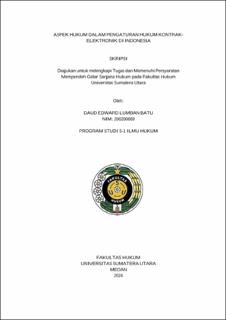| dc.description.abstract | This research aims to find out and explain the explanation of digital contract regulations in Indonesia based on the Civil Code Law and the Electronic Transaction and Information Law (UU ITE). The issues discussed in this thesis are the regulation of contract law in Indonesia, comparison of conventional contracts and digital contracts, and the effectiveness of the implications of digital contracts based on Indonesian law.
The validity of an electronic contract is determined by its compliance with legal provisions, not solely its physical form. The digital revolution has enabled business transactions to be carried out electronically, creating legal relationships that utilize computer network infrastructure and the internet. Article 1338 of the Civil Code enforces the "Principle of Freedom of Contract", whereby electronic contracts must be thoroughly checked to ensure that they fulfill the legal requirements for agreements in conventional contracts as regulated in Article 1320 of the Civil Code. The research method used is a normative legal method with library research carried out to obtain the required data, including primary, secondary and tertiary legal materials related to the issues discussed.
Electronic contracts are agreements made using information technology or electronic devices. The contract is valid and has the same legal force as a conventional agreement if it meets the legal requirements of the agreement. It can be said that if these conditions are met, the agreement or contract can be said to be valid. Digital contract law in Indonesia has been regulated explicitly through several regulations, such as the Information and Electronic Transactions Law (UU ITE) and related regulations that regulate electronic transactions. However, even though there is a clear legal framework, its implementation and implementation still faces various challenges. Digital contracts, which generally take the form of agreements made electronically, must meet the requirements for the validity of an agreement in accordance with Article 1320 of the Civil Code (KUHPerdata), namely the existence of agreement, skills, clear objects and lawful causes. In a digital context, fulfilling these conditions can become more complex, especially related to the identification of the parties involved and clarity of the object of the agreement. | en_US |


